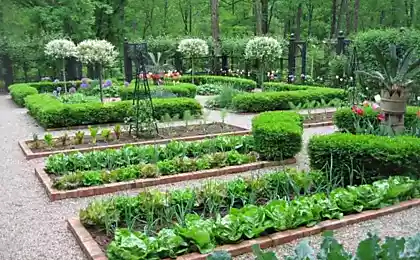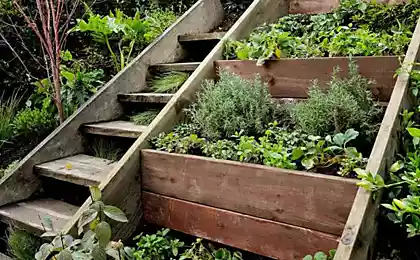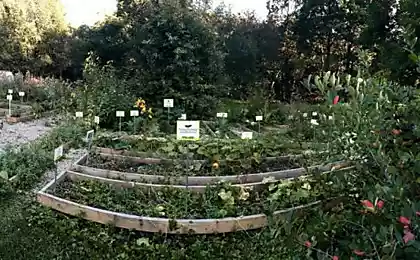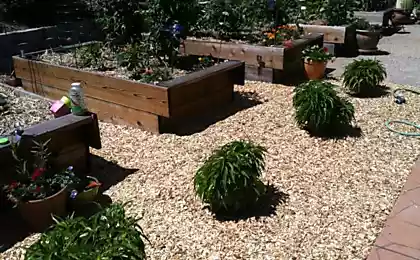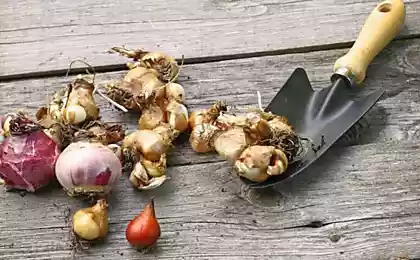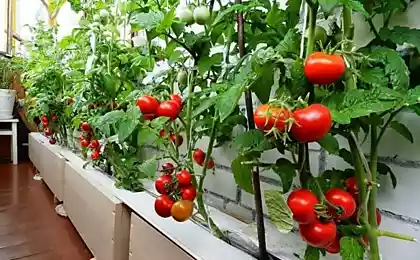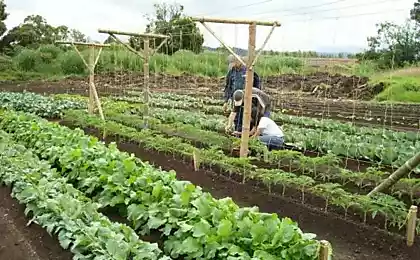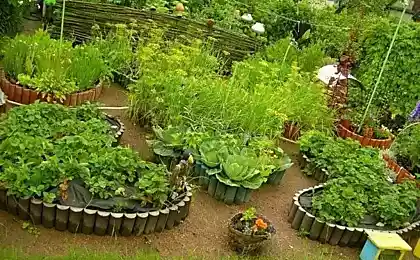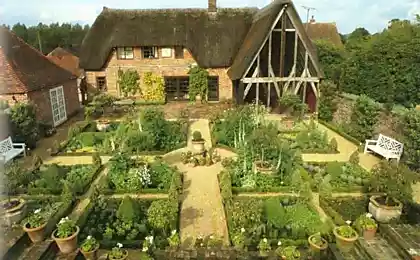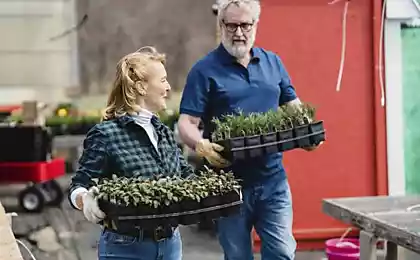401
The 10 commandments gardener by Catherine Delvaux
The famous French gardener, writer Catherine Delvaux (Delvaux Catherine) wrote a series of books dedicated to organic farming and gardening. All of her books are accompanied by a huge number of colorful pictures and immerse the reader in a completely different world. Here are a few commandments for the gardener, thinking about the environment.
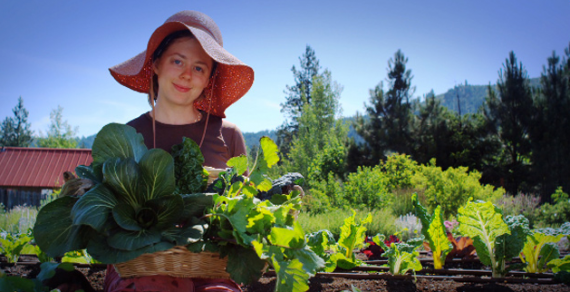
Katherine Delvaux: Organic farming, permaculturally Delvaux, an agronomist by training, is editor of "Relaxing garden" and the author of over 30 books on gardening that have become bestsellers. Her only book translated into Russian language Secrets for your garden (Le Carnet Jardinier).
1. Know your land
It is useless to start planting until you have no idea what you soil. Alkaline or acidic soil with a low content or a large amount of humus, well-drained or heavy composition? Any advantages and disadvantages of the soil will affect the range of plants. And you should not expect that you will be able to improve the soil with imported soil (peat, ash, sand, clay).
Experience shows that it is very difficult and expensive business, and never fix the situation permanently as the nature in any case will take up. You should choose plants based on the type of your soil, and not Vice versa.
2. Look after your land
The quality of the earth depends directly on how easy it will be to grow your planting, so keep the soil! Do not treat it with heavy equipment, do not change its structure, cultivating it at random, especially if the soil is sandy.
Do not use chemicals, from which she can't get rid of, don't leave her naked, spread on the previously nezarazene areas and make the land organic fertilizers a few months after sowing.
3. Forget about pesticides
The term "pesticide" is formed from the Latin words — the verb "caedere" (to kill) and the noun "pestis" ("plague"). Similar are the origin of words: herbicides, fungicides, insecticides, nematicides.
Remember that the market is not sold by harmless chemicals. So why poison the land, and ultimately yourself, because the resulting crop will be Packed with harmful ingredients!
4. Change your approach
It is not necessary to call certain plants weeds, kill spiders, because they are "nasty" or go crazy because of the aphids on the rose bushes. If you slightly change your viewing angle, you will see in every living creature (and plant) are important part of nature, we need to feed birds and animals, contribute to the natural cycle of life.
This does not mean that you should give the weed grass to flood your land, and insects to destroy plantations. Just don't treat them as enemies, against whom any and all methods.
5. Remember on biological diversity
This paragraph flows logically from the previous one. Remember that biological diversity is the key to prosperity (literally) of your garden. So sometimes we should not interfere in the natural course of things.
This means that your site is a place not only to crop plants but also for wild flowers. You are not trying to destroy any way some not too pleasant insects, and allow them to exist because they occupy a pivotal place in the food chain. It also means that you have a small pond (can be quite a small pond) in which they live, amphibians, big fans of larvae and insects.
In turn, birds that destroy insects are in need of berries to eat in the winter, so don't vikorchovivat all the bushes with wild berries growing in your area.
6. Leave a bit of a mess
Perfectly manicured garden can produce a painful impression. Japanese art by creating a garden teaches that always needed a bit of a mess, which brings a sense of naturalness, reminiscent of wild area of nature, miraculous and beautiful.
You can clear the lawn of old leaves, but not throw them, and fold along the fence for the formation of humus.
Do not pluck the nettle and cut it at the root, which will promote the formation of nutrients in the soil.
Do not cut the branches of shrubs to APR: the remaining berries serve as food for birds in winter.
7. Keep dead trees
Despite widespread prejudice, dead trees are not a source of parasites or disease to the surrounding garden. They are essential for many living organisms both small, and large. Some insects such as the hermit ordinary (Osmoderma eremita), found only in the dry and are a protected species (listed in the Red book of Russia and Ukraine).
Only covernote old stump and you will see that inside it is full of life. Dead trees also attract birds, they make their nests in hollows of old trees, woodpeckers, titmouses, red-crested Vanga, white-capped Redstarts.
8. Do not spare compost
Compost is a panacea, with him in the sandy soil get organic nutrients that he so badly lacks. It also makes the hard ground soft, bringing valuable elements essential for plant growth, for example, humus.
If you use compost before it is completely decayed, it may be the perfect "bitch" to shelter plants, which even on the surface of the earth gradually eat earthworms. A layer of compost in 10 cm protects plant roots from extremes of temperature, frost and thaw in winter and from hot sun in summer.
9. Don't throw anything away!
We must return to the earth what she gives us. Therefore, do not dispose of grass after I mow the lawn, turn it into the humus, or use the mulching attachment, which will finely chop the grass and back grass becomes fertilizer which enrich the soil with nitrogen.
Never dispose of dry leaves: they cover the plants for the winter. Use all the weeds: throw them in the compost pile where the heat produced during the decay, will destroy weed seeds and turn them into nutritious humus.
10. Save water
To reasonably use the water, watering plants directly at the roots or use drip irrigation system. If you live in a dry region, it is better to refuse from plants that require frequent and abundant watering. Not to allow the water to evaporate, straw, covers every inch of bare land. published
P. S. And remember, just changing your mind — together we change the world! ©
Join us in Facebook , Vkontakte, Odnoklassniki
Source: www.ecology.md

Katherine Delvaux: Organic farming, permaculturally Delvaux, an agronomist by training, is editor of "Relaxing garden" and the author of over 30 books on gardening that have become bestsellers. Her only book translated into Russian language Secrets for your garden (Le Carnet Jardinier).
1. Know your land
It is useless to start planting until you have no idea what you soil. Alkaline or acidic soil with a low content or a large amount of humus, well-drained or heavy composition? Any advantages and disadvantages of the soil will affect the range of plants. And you should not expect that you will be able to improve the soil with imported soil (peat, ash, sand, clay).
Experience shows that it is very difficult and expensive business, and never fix the situation permanently as the nature in any case will take up. You should choose plants based on the type of your soil, and not Vice versa.
2. Look after your land
The quality of the earth depends directly on how easy it will be to grow your planting, so keep the soil! Do not treat it with heavy equipment, do not change its structure, cultivating it at random, especially if the soil is sandy.
Do not use chemicals, from which she can't get rid of, don't leave her naked, spread on the previously nezarazene areas and make the land organic fertilizers a few months after sowing.
3. Forget about pesticides
The term "pesticide" is formed from the Latin words — the verb "caedere" (to kill) and the noun "pestis" ("plague"). Similar are the origin of words: herbicides, fungicides, insecticides, nematicides.
Remember that the market is not sold by harmless chemicals. So why poison the land, and ultimately yourself, because the resulting crop will be Packed with harmful ingredients!
4. Change your approach
It is not necessary to call certain plants weeds, kill spiders, because they are "nasty" or go crazy because of the aphids on the rose bushes. If you slightly change your viewing angle, you will see in every living creature (and plant) are important part of nature, we need to feed birds and animals, contribute to the natural cycle of life.
This does not mean that you should give the weed grass to flood your land, and insects to destroy plantations. Just don't treat them as enemies, against whom any and all methods.
5. Remember on biological diversity
This paragraph flows logically from the previous one. Remember that biological diversity is the key to prosperity (literally) of your garden. So sometimes we should not interfere in the natural course of things.
This means that your site is a place not only to crop plants but also for wild flowers. You are not trying to destroy any way some not too pleasant insects, and allow them to exist because they occupy a pivotal place in the food chain. It also means that you have a small pond (can be quite a small pond) in which they live, amphibians, big fans of larvae and insects.
In turn, birds that destroy insects are in need of berries to eat in the winter, so don't vikorchovivat all the bushes with wild berries growing in your area.
6. Leave a bit of a mess
Perfectly manicured garden can produce a painful impression. Japanese art by creating a garden teaches that always needed a bit of a mess, which brings a sense of naturalness, reminiscent of wild area of nature, miraculous and beautiful.
You can clear the lawn of old leaves, but not throw them, and fold along the fence for the formation of humus.
Do not pluck the nettle and cut it at the root, which will promote the formation of nutrients in the soil.
Do not cut the branches of shrubs to APR: the remaining berries serve as food for birds in winter.
7. Keep dead trees
Despite widespread prejudice, dead trees are not a source of parasites or disease to the surrounding garden. They are essential for many living organisms both small, and large. Some insects such as the hermit ordinary (Osmoderma eremita), found only in the dry and are a protected species (listed in the Red book of Russia and Ukraine).
Only covernote old stump and you will see that inside it is full of life. Dead trees also attract birds, they make their nests in hollows of old trees, woodpeckers, titmouses, red-crested Vanga, white-capped Redstarts.
8. Do not spare compost
Compost is a panacea, with him in the sandy soil get organic nutrients that he so badly lacks. It also makes the hard ground soft, bringing valuable elements essential for plant growth, for example, humus.
If you use compost before it is completely decayed, it may be the perfect "bitch" to shelter plants, which even on the surface of the earth gradually eat earthworms. A layer of compost in 10 cm protects plant roots from extremes of temperature, frost and thaw in winter and from hot sun in summer.
9. Don't throw anything away!
We must return to the earth what she gives us. Therefore, do not dispose of grass after I mow the lawn, turn it into the humus, or use the mulching attachment, which will finely chop the grass and back grass becomes fertilizer which enrich the soil with nitrogen.
Never dispose of dry leaves: they cover the plants for the winter. Use all the weeds: throw them in the compost pile where the heat produced during the decay, will destroy weed seeds and turn them into nutritious humus.
10. Save water
To reasonably use the water, watering plants directly at the roots or use drip irrigation system. If you live in a dry region, it is better to refuse from plants that require frequent and abundant watering. Not to allow the water to evaporate, straw, covers every inch of bare land. published
P. S. And remember, just changing your mind — together we change the world! ©
Join us in Facebook , Vkontakte, Odnoklassniki
Source: www.ecology.md

